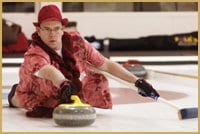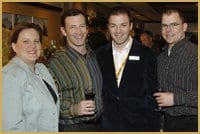
Phil Ivers of Calgary throws the last rock at the OutGames' recreational bonspiel, Apr 7 in Calgary Credit: (Shelagh Anderson photo)
CALGARY–When people think of Calgary many attributes come to mind: conservative, wealthy, and perhaps somewhat intolerant. That’s why it came as a surprise to many that the Stampede City would launch the first-ever North America OutGames, a continental version of the international queer sporting event, complete with a human rights conference and a cultural festival.
Achieving a quantum leap in cosmopolitanism, thousands of athletes, activists and audiences descended upon the city centre where the bulk of the festivities were taking place. Where previous Calgary mayors have been unable or unwilling to endorse Pride Week celebrations, reigning Mayor David Bronconnier officially proclaimed Apr 1-8, 2007, “Calgary OutGames Week.”
“I have been doing double takes for the last 48 hours; I can’t believe I am in Alberta,” said Torontonian Leon Mar, a featured speaker and delegate at OutRights, the two-day conference that kicked off the week.
“The community here is really connected; it’s such a strength. I have really enjoyed everything about the conference,” Mar added.
Sharanpal Ruprai, a graduate student at the University of Calgary concurred. “The conference has been fantastic, really well organized. And unlike other conferences I have been to, there have been fabulous discussions amongst the delegates at the sessions–we have not just been listening to talking heads.”
Judy Shepard, who lost her 21-year-old son Matthew to a murder motivated by anti-gay hate, was one of the keynote speakers at OutRights. After reading her victim impact statement from the 1999 court case that indicted her son’s murderers, Shepard implored delegates to live fully out lives in order to combat ignorance. “Just because you have changed laws in Canada, does not mean that you have changed everyone’s hearts and minds,” she warned.
The OutGames sporting events also marked the 25th anniversary of the Western Cup, an annual tournament produced by Calgary’s Apollo Friends in Sport.
The Cup’s silver anniversary attracted more than 500 athletes, who competed over three days in seven sports: badminton, bowling, curling, running, swimming, volleyball and, new to the Western Cup, hockey.
Winnipegger Paul Sherwood was thrilled with the new addition. “I competed a decade ago in volleyball, but in reality I am a hockey player, and was happy to see my sport included,” he said.
“It would be great if, in the long run, we could develop the sport enough across the country that we could have an equivalent of the Stanley Cup for gay hockey,” he added.
Joanne Pataky, the Calgary volunteer coordinating the hockey tournament, is optimistic about the future of Western Cup hockey. “Organizing hockey has been a blast,” she said. “This is the first year we introduced hockey and we got out 130 participants. Next year I think we will be able to grow to 16-20 teams in competition.
“I have got a great committee working with me and we are all committed to doing this again,” she added.
Lorraine Catellier, also from Winnipeg, found herself in the unexpected position of playing pick-up goalie for one of the men’s hockey teams in competition when their goalie got injured. Rising to the challenge, she observed, “Playing on a men’s team, the shots are a lot harder and the game faster. I was offered my own dressing room because I am a woman, but the guys were great and I made the decision to change with them,” she continued.
“Now I have seen more naked men then I ever thought I would see,” she laughed.
As much fun as most of the athletes seemed to be having, for many the competitive aspect of the games remained primary. “I have seen a curling team cry when they did not make the semi-finals,” said Kelly Ernst, a local curler and board member with the Calgary OutGames Legacy group, which coordinated the entire week of events.
To meet the needs of those looking for a more intense experience, the bonspiels were split into the Chaps competitive division and the Spurs recreational division. Most teams competing in the Spurs section seized the opportunity to don alternative uniforms that ranged from leather harnesses to pink capes. Ernst’s own team, the Rockettes, wore their own special brand of drag: flower-print granny dresses compete with billowing hips, sagging cleavage and pearls.
Their Vancouver competitors, the Ho-Lots, were rather more understated in green-sleeved polyester jerseys. Ho-lotta member Sindee (aka Tim Beaulieu) has been coming to Western Cup bonspiels for eight years.
“We love it, it’s a great tournament,” he enthuses. “I really like that there are evening activities to go to as well,” he adds.
However, the Ho-Lots have mixed feelings about the Western Cup’s amalgamation into the much larger OutGames celebrations.
“Our registration fees went up $75 this year and we have yet to see the added value,” explained Beaulieu. “Although I can appreciate Calgary’s efforts in trying to expand, I wonder if they are setting themselves up for financial disaster. After all, we all know the Montreal OutGames lost money.”
Beaulieu’s words met with a ‘ho-lotta’ nodding in agreement at the team table.
Despite winning silver in Saturday’s 5 km race, Calgary runner Lynne Darlington said she was “a bit disappointed that more people did not come.”
Still, she said, she did run against people from all over North America, including runners from Houston and Florida. “I bet they were not expecting our cold weather,” she said, sympathetically noting the unexpected plunge in temperature.
Bolstering the sometimes low turnout, was the occasional straight ally competing in the games. Calgary councillor and sitting Deputy Mayor Joe Ceci won a silver medal running. “There were not that many people running against me in the over-50 age category,” he said sheepishly.
Meanwhile, Victoria’s Raffaele Gaudio proved a badminton dynamo, winning gold in the competitive doubles and silver in the singles competition. “This is my first Western Cup and the thing that surprised me the most is the diversity, there are so many different people here. I really did not expect that,” he said.
Expectations ran highest for OutFest, the cultural festival that snaked throughout OutGames week, with comedy heavy hitter Lily Tomlin as the headliner. The festival was produced by the Fairytales Presentation Society, Calgary’s local queer film festival.
Local arts and film aficionado Gary Krivy attended OutFest virtually every evening. “Everything has been great but BitchSlap, in particular, was hilarious,” he said. BitchSlap was a saucy production by award-winning Edmonton theatre troupe Guys in Disguise, which pitted a haughty Joan Crawford against a caustic Bette Davis–both in drag.
“The Singing Out event [which featured choruses from Calgary and Winnipeg] hit just the right note,” punned Dennis Meissner, also from Calgary. “However, the event that impressed me the most was the OUTrageously Real Queer Conscience spoken word event; those writers were amazing.”
Produced by Alberta poet-chanteuse and agitator Sheri D Wilson and her brainchild, the Calgary International Spoken Word Festival, the evening featured seven performing writers and launched Canada’s first-ever anthology of gay male poets. Cleverly titled Seminal the anthology was edited by Victoria’s John Barton and Vancouver’s Billeh Nickerson, and published by Arsenal Pulp Press.
Still, it was Lily Tomlin that everyone was really waiting for. Eleven hundred fans filled the concert hall at the Epcor Centre for Performing Arts and showed their love for Ms Tomlin with four standing ovations, Apr 7. They cheered particularly earnestly when she roasted Prime Minister Stephen Harper and former Alberta Premier Ralph Klein.
There were further whoops and hollers when Tomlin came back for a final encore wearing a Calgary Flames hockey jersey. She was promptly “white-hatted”–a Calgary tradition of crowning visiting dignitaries in a white, 10-gallon cowboy hat.
Spilling across the street from the concert hall to the convention centre, the revelry morphed into a glittery, massive dance party titled Silver, where more than 2,000 people shook their collective booty, despite an absent, plane-was-grounded-couldn’t-make-it-to-Calgary, DJ.
Calgarians citywide could not help hearing the rhythm throughout OutGames week. Featured daily in the local media and garnishing national media attention, most observers claimed it was the biggest, gayest moment in Calgary’s history.
“The long-term legacy of the OutGames in Calgary will be both confidence and autonomy. We have finally stopped asking for permission to create the environment and community we want,” declared OutRights chair Sue Cress.
The OutGames illuminati were impressed as well. The Gay and Lesbian International Sporting Association (GLISA), the body that sanctions the OutGames and selects host cities, had nothing but praise for Calgary’s efforts.
“The quality of the human rights conference was exceptional, Judy Shepard’s address being particularly noteworthy and, let’s face it, being around so many beautiful gay men is fantastic,” enthused GLISA board member Daniel Vaudrin from Montreal.
His colleague Debbie Storrs from Houston was equally affirming. “This has been awesome. Calgarians are a very friendly, open people,” she said. “We learned a lot from Montreal, have learned a lot here and I think Philadelphia [host city of the second North American OutGames in 2008] is going to be great, too.”
Perhaps the attendee furthest from home was Denmark’s Ole Udsholt on a research mission. Said the 2009 Copenhagen World OutGames co-president, “Coming to Calgary I learned that in doing something intensely local you can still reach out and have a big impact. It seemed to me, from my outside perspective, that despite whatever has happened in the past your whole community was behind the OutGames. It has been very inspiring.”

 Why you can trust Xtra
Why you can trust Xtra


